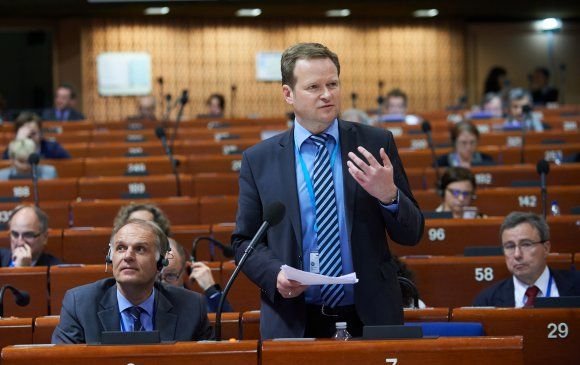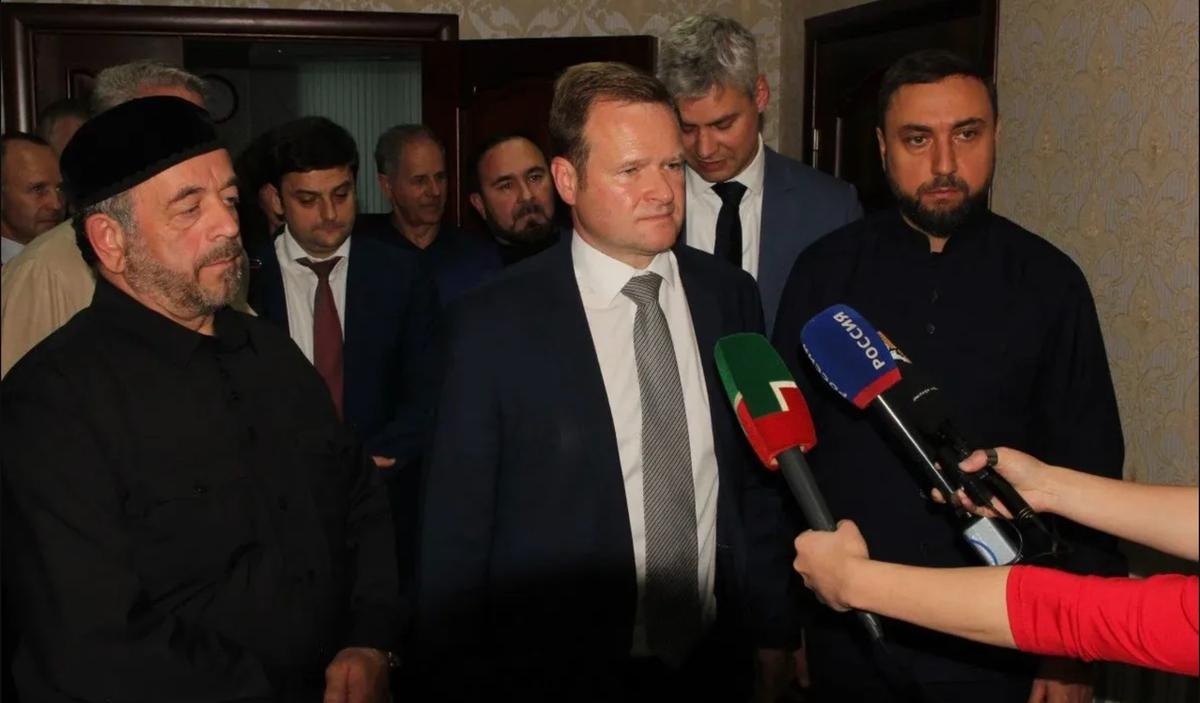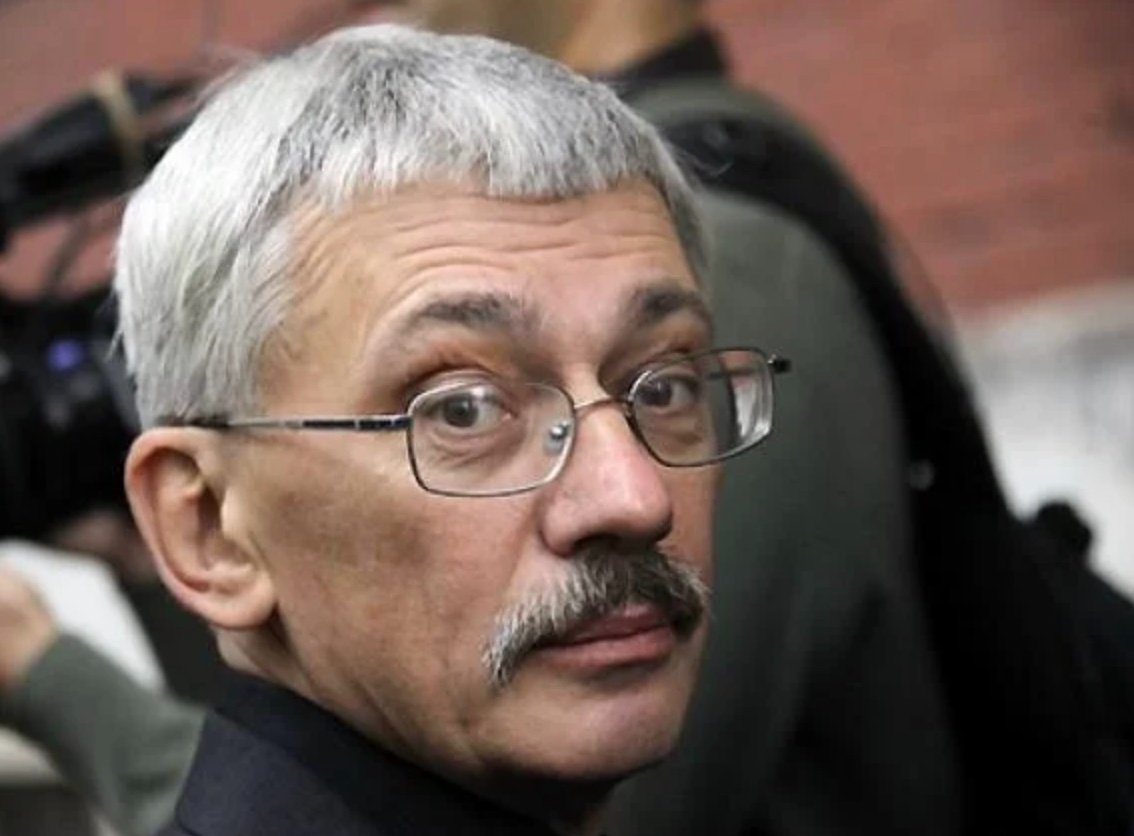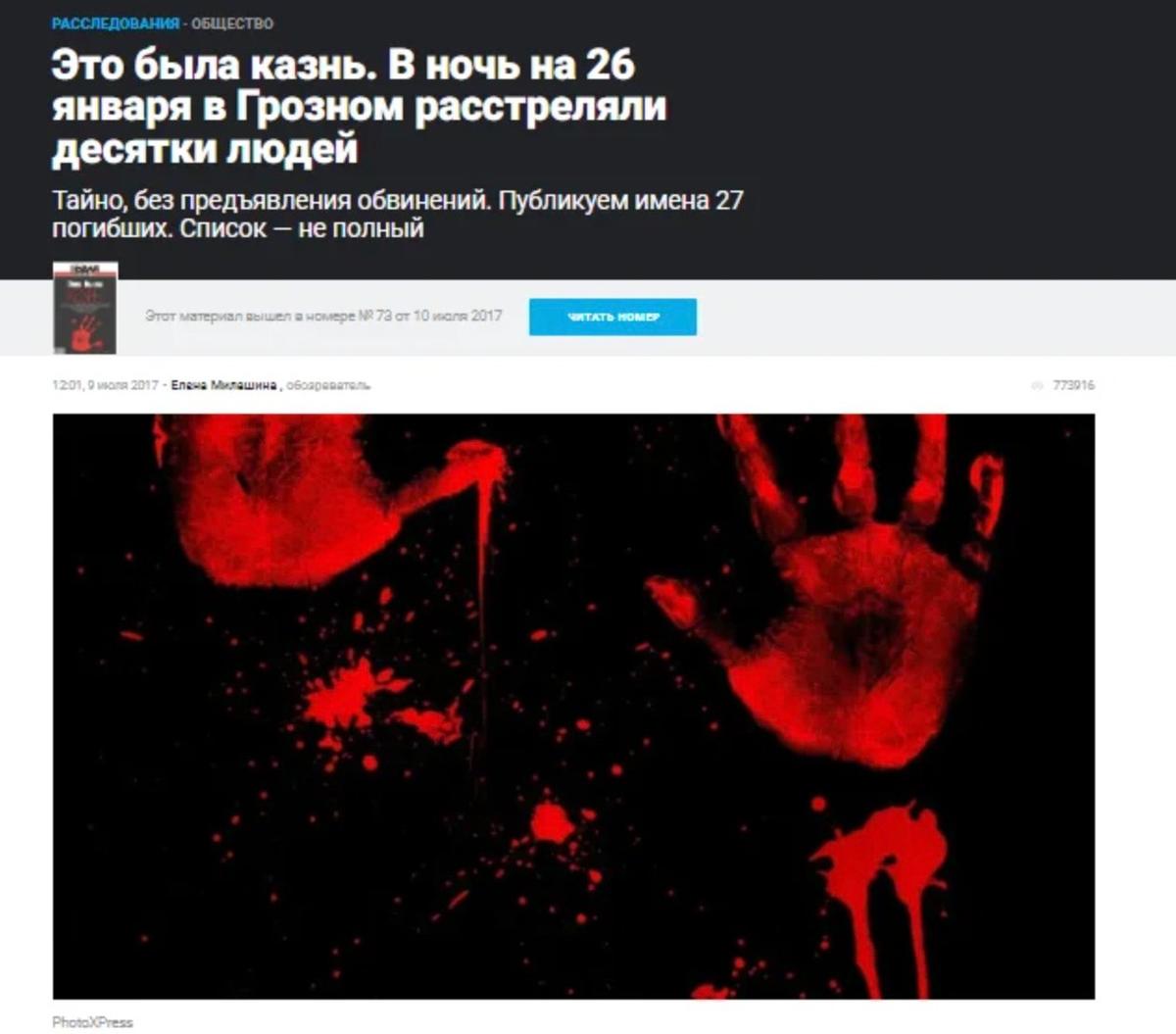
Frank Schwabe, PACE Special Rapporteur on the North Caucasus. Photo: aravot-ru.am
The summer session of the Parliamentary Assembly of the Council of Europe (PACE) took place in Strasbourg last week. Russia’s delegation was not present since its membership had been suspended by PACE on 14 March due to the Ukraine War.
The session was not covered in Russia at all, although Russia itself was a popular topic for discussion in Strasbourg these days. Apart from the Ukraine War and the humanitarian disaster it produced, as well as the 2014 Malaysia Airlines Flight 17 shoot-down which Russia had been officially declared responsible for, the human rights situation in Russia’s North Caucasus region attracted special interest, as Frank Schwabe from Germany, who was appointed PACE’s rapporteur on the North Caucasus in 2017, presented his long-prepared report.
Novaya Gazeta’s investigation on the matter aroused PACE’s interest back then, especially the situation on LGBT and female rights violations in the androcratic Muslim regions of Russia’s south.
Five years have passed, and the Assembly has finally decided to revisit this topic.
Surprisingly enough, Russia supported Schwabe’s appointment in 2017. The country’s MPs gave the PACE member a warm welcome in Moscow in 2019 and even organised a trip to Chechnya for him.
The reasons behind this hospitality are pretty obvious. In 2017, Russia’s MPs were reinstated in Strasbourg after having been suspended for three years due to the 2014 Crimea crisis. Additionally, Schwabe was so nice to the Russian MPs that some human rights activists started to believe Russia was using the PACE rapporteur for its own propaganda. Thus, Interfax, a Russian news agency, referred to Schwabe as “PACE rapporteur on LGBT rights in Chechnya.” Petr Tolstoy, the State Duma deputy chairman, stated with confidence that Chechnya’s oppressions of the LGBT community were “nonsense” and that the rapporteur would “see this for himself when he discusses the matter with the Head of Chechnya [Ramzan Kadyrov].”

Frank Schwabe visiting Chechnya, 2019. Photo: chechnyatoday.com
Schwabe himself ignored these statements. His team tried to organise an alternative trip programme to Chechnya and contacted the Russian human rights activists, asking them to find people who had suffered oppression from the Kadyrovites and were ready to meet Schwabe in Chechnya in person. The activists told Schwabe that no people had a death wish: the times when a European official could meet ordinary people in Chechnya were long gone. They discouraged him from travelling to Chechnya and suggested that he met Alexander Bastrykin, head of Russia’s Investigative Committee, instead of speaking with Ramzan Kadyrov. The Investigative Committee is known to have covered up hundreds of crimes committed by the Chechen officials in the past decades; challenging Bastrykin with some tough questions would be a far more efficient tactic for Schwabe to follow. He, however, ignored these suggestions, too.
Schwabe’s trip to Chechnya turned out to be not what he expected, obviously. Kadyrov deliberately ignored his visit.
Аnd Schwabe was only allowed to speak to Ruslan Alkhanov, the local Interior Minister, and Nurdi Nukhazhiev, the local ombudsman. The latter gave Schwabe a wordy lecture; the German was told that Ramzan Kadyrov had made an enormous contribution to the Chechen (and worldwide) human rights movement. Nukhazhiev also presented Schwabe with a symbolic "anniversary report paper on the human rights situation in the Chechen Republic" with his signature. Thus, Schwabe had no chance to bring up any sensitive issues or ask the Chechen officials any tough questions.
His trip to Chechnya was a disappointment, although the PACE rapporteur promised to visit the North Caucasus once more in the future — not Chechnya, however, but Dagestan, Ingushetia, and other republics he needed to cover in his report.
This second visit never happened, though: the Covid-19 pandemic and the Ukraine War kept Schwabe from coming, although Russia was ready to accept him any time. The Ukraine War has made a crucial impact on Schwabe’s evaluation of how things are in the North Caucasus, of course.
“The situation with regard to human rights and the rule of law in the North Caucasus has not improved since the Assembly’s last resolution. The authorities of the Russian Federation have not implemented any of the Assembly’s recommendations. Civil society is being persecuted to the point that it has practically ceased to function in the region; LGBT persons, women, and girls, are subjected to extreme violence and fear; the sense of impunity persists, and extremism grows. Those fleeing from persecution in the North Caucasus region are not safe anywhere else in the Russian Federation and even abroad, as Chechen security services have extended their reach beyond the borders of the Russian Federation,” reads the report.
These are the conclusions made by Frank Schwabe which were agreed upon by the PACE members who voted for a resolution named “The continuing need to restore human rights and the rule of law in the North Caucasus region.”
Schwabe’s report is, of course, a very crude one, but it is, at the same time, also disappointingly futile and poorly researched.
Its biggest downside is, of course, lack of “field study.” Schwabe only spent one day in the North Caucasus, and he spent this day in Chechnya. It is very unlikely that he managed to get a deep insight into the specific nature of the region. It is crucial to tell the difference between Chechnya and other republics of the North Caucasus, and here is why. Anyone who spends a certain amount of time in Chechnya and then leaves it for a neighbouring region senses an unmatched feeling of freedom as if they crossed the border between North and South Korea.
Although Schwabe could not speak with the victims of Kadyrov’s regime in person, Russia’s human rights activists did their best to help him get the hang of things. They set up video calls with different Chechens for him, including victims of torture, relatives of the unlawfully executed individuals, or gay people who had gone through custody in special “secret prisons.” One of the people Schwabe spoke to was Suleyman Gezmakhmayev, a former Chechen police officer, who confirmed that the Chechen authorities used the local police and National Guard for systemic oppression.
They told Schwabe of insane unpunished oppression, but it is important to understand that this applies to Chechnya only. The rest of the North Caucasus does not have a personality cult, mass extra-judicial executions or “LGBT cleansing” campaigns. That being said, the human rights situation in Chechnya and the rest of the North Caucasus is very different.
Oleg Orlov, a human rights activist and one of the top experts on Northern Caucasus, tried to convey this very important idea to Schwabe: “It isn’t right to treat the North Caucasus as a whole. Of course, there are similarities, but the situation in different republics of the region is very different... The entire region is known for very little respect for human rights, but the situation in Chechnya is a different league,” he said.

North Caucasus expert Oleg Orlov. Photo: Human Rights Center MEMORIAL
Schwabe’s report is wrong for this baseless generalisation. Unfortunately, its author did not heed what the Russian activists told him.
He could have narrowed his report to Chechnya alone since its horrible attitude towards human rights is unparalleled. He could have also criticised the EU policy on Chechen refugees more and provided a deeper analysis of the ridiculous acts of cooperation between the EU police agencies and Russia’s FSB, including the exchange of sensitive information on the people who had fled mortal danger and sought shelter in Europe, yet were betrayed by Europe’s officials and judges and handed over to the Russian and Chechen security agencies.
Schwabe’s report, just like the previous reports made by PACE, does mention Interpol’s wretched policy of pandering to Russia’s requests to hand over Russian nationals upon baseless accusations of terrorism. But instead of analysing such cases in his report (this does not require visiting Russia and could have been done even during the pandemic), Schwabe simply calls on Interpol to be “specifically careful when checking requests regarding individuals from the North Caucasus region.”
And finally, Mr Schwabe had a chance to analyse the statistics of the appeals Russia’s activists had been filing to the European Court of Human Rights (ECHR) for decades, including those that fall under ECHR’s Rule 39 on urgent measures. The activists used this rule to protect people kidnapped or detained by Russia’s officials from mortal danger. The rule was used by them to protect people not only from Russia’s or Chechnya’s authorities, but also from Europe’s bureaucrats and security agents. The case of Akhmet Siriyev is a perfect example. Siriyev and his mother fled Chechnya and settled in Germany after Akhmet’s brother Magomed had been kidnapped by the Kadyrovites in December 2016 and executed alongside 26 other people in January 2017. Akhmet Siriyev was detained by Kadyrov’s men twice and narrowly escaped imprisonment and potential death before leaving Chechnya.

Review of the "Novaya Gazeta" into the execution in Grozny 27 man. Text published in July 2017.
Although there was a lot of evidence that what Siriyev and his mother said was true and despite the fact the ECHR had investigated the execution of 27 people, Germany’s Federal Office for Migration and Refugees ruled they were not facing danger and ordered the deportation of the two back to Russia. It took one of Russia’s human rights organisations enormous effort to cancel the decision and keep the two safe. Another refugee, Suleyman Gezmakhmayev, a former Chechen police officer who witnessed the January 2017 mass execution, the bloodiest extrajudicial killing in Russia’s history, was also denied refugee status by the German authorities. None of the cases were mentioned in Schwabe’s report.
Such policy is common for European countries, despite the fact that it is a blatant violation of both the Geneva conventions and the European Convention on Human Rights.
Although Frank Schwabe could not conduct proper field research in Russia due to the pandemic, he had enough opportunities to prepare a valid and useful report.
Instead, he opted to mash together all known cases of human rights violation both in the North Caucasus and Central Russia to simply prove something that hardly required proof. There is no denying that Russia has very little respect for human rights in general. But simply listing all known cases of human rights violation, sometimes actually comma separated, looks embarrassing. Moreover, Schwabe’s report is abundant in mistakes, both factual and analytical. For instance, he devoted an entire paragraph to the murder of Stanislav Markelov and Anastasia Baburova; instead of properly analysing the case, he relied on a single newspaper article from 2009 and concluded that Russia’s FSB were responsible for the murder, when in fact the true murderers were members of BORN, a neo-Nazi group. The FSB, of course, has its arms wet to the elbows with blood. But is there really a point to assign blame on them for the crime they most certainly did not commit — for purely political reasons?
Such approach is most evident — and most dangerous — in the report’s chapter called “Rising extremism and risk of terrorism”. Frank Schwabe follows an old cliché Europe got used to during the 1990s Chechen Wars which considers human rights oppression in the North Caucasus a side effect of fighting global terrorism. The terrorist threat in the region is minimal nowadays, and Schwabe admits it, yet the level of oppression towards the population is still extremely high. So, is justifying oppression with “fighting terrorism” the right thing to do? Schwabe could have brought this issue about in his report, but he opted to baselessly assume that “the terrorist threat in the North Caucasus” had increased instead.
And, finally, the central focus of Schwabe’s report was supposed to be the persecution of LGBT people — and women’s rights. The rapporteur had enough opportunity to deeply analyse the reasons behind such discrimination, namely, the barbaric homophobic and misogynistic policy of Russia’s federal authorities. Persecution of gay people in Chechnya, mutilating surgeries on girls’ genitals, as well as “honour killings” aimed mostly at women are examples of extreme manifestation of such policy; it is present, in one form or another, in all regions of Russia, not only Chechnya or the North Caucasus.
Unfortunately, Schwabe’s report lacks the slightest effort to analyse the “traditionalism” tendency of Russia’s government that has been growing since 2006. Sadly enough, this tendency is used not only to persecute gay people in Chechnya, but also to justify the invasion of Ukraine.
